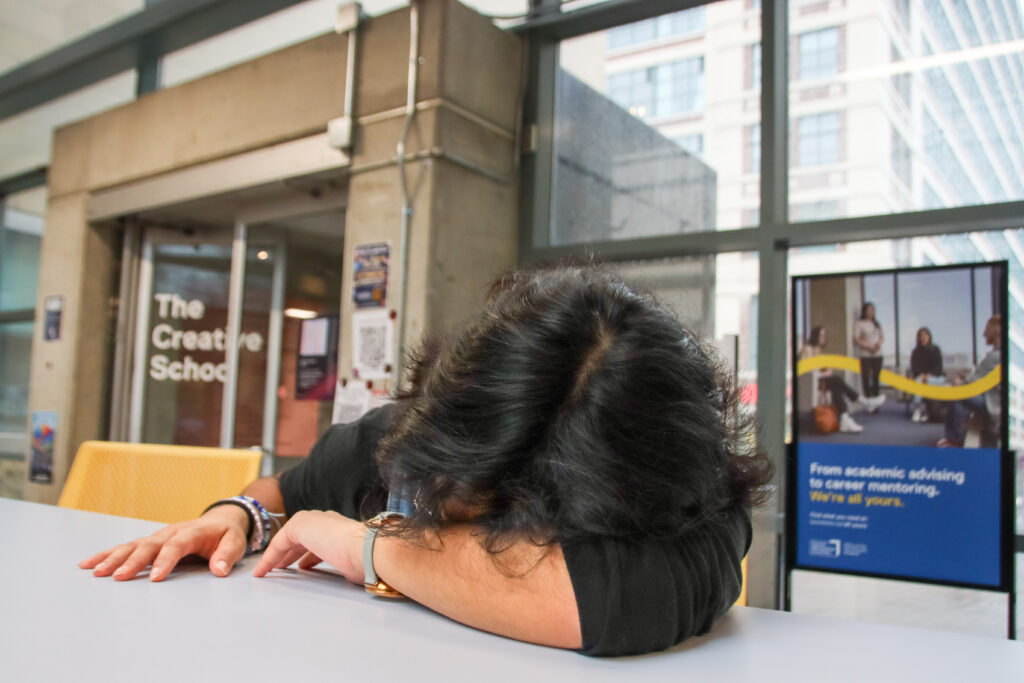Listen to the full story here:

A recent survey shows overwhelming support for the introduction of nap pods on campus, with 98 per cent of the 1,113 participating students backing the initiative. The survey was conducted by the Faculty of Community Services Society (FCSS) at Toronto Metropolitan University (TMU).
“A lot of our students have placements, jobs, regular classes and other commitments that leave them exhausted and sleep-deprived,” said Daniel Barkin, the course union’s executive director, who explains that the idea stemmed from extensive community consultations with students.
Barkin says the timing of the proposal is crucial especially as the cost of living continues to rise. “The nap pods could provide a much needed resource for those struggling to find rest,” he said.
Nap pods have already rolled out on several other Canadian campuses, including the University of British Columbia (UBC), Algonquin College and Wilfrid Laurier University, and have even proven to be effective at some professional workplaces.
Currently, TMU students only have access to the Commuter Hostel for snoozing between studying, which often has long waitlists and primarily caters to commuter students who need overnight sleep, leaving students with early classes and late work hours without convenient options for rest. According to Barkin, FCSS’ plan includes purchasing two nap pods, with potential costs ranging from $5,000 to $25,000.
The few concerns received during the survey related to the source of funds and potential misuse of pods — issues that allegedly led to the closure of UBC’s nap rooms — Barkin was adamant that the pods would be paid for from the union’s budget, leaving other student services unaffected.
“I know it sounds very small, like ‘Oh why are we burning so much money to solve two students’ problems a day,’ but it could help a lot more if 12 students can book naps every day,” he said.
FCSS is continuing to consult with key stakeholders and university administration and finalize logistics, such as hygiene, storage, location, safety and the booking process. Barkin says future students could have the option to book naps ranging from 30 minutes to three hours on campus.
Dr. Richard Horner, a sleep sciences expert at the University of Toronto, says good sleep can boost performance by 10 to 15 per cent. But naps longer than 30 minutes could potentially backfire, he says. “If you have a three hour nap in the afternoon, it’s going to be pretty hard to get decent sleep in the evening…It’s not the same type of sleep that’s going to boost learning and memory.”
Dr. Nick Kates, a psychiatrist at McMaster University, says there’s a difference between a 30-minute nap and sleeping during the day to make up for lost rest. “If you need two or three hours, then it’s a different, more serious kind of sleep problem you’re dealing with,” he said, pointing to chronic sleep disorders. Dr. Horner adds that external social and academic stressors could also be a factor.
If universities made cognitive behavioural therapy (CBT) and cognitive behavioural therapy for insomnia (CBTI) more accessible, it could make a “fairly significant difference with sleep,” said Dr. Kates.
TMU president Mohamed Lachemi said he encourages students to connect with Student Wellbeing for “tips and recommendations on getting enough sleep” and “important supports like counselling and programming.”
With no set timeline for the pods’ arrival announced, Barkin says he hopes FCSS’ groundwork, data and community consultations inspire other faculties and student societies to purchase the sleep capsules. “The more nap pods on campus, the easier it will be for students to succeed.”
Kinza Zafar (she/her) is a reporter for OTR, Fall 2024.
This article may have been created with the use of AI tools such as
Kinza Zafar (she/her) is a reporter for OTR, Fall 2024.
